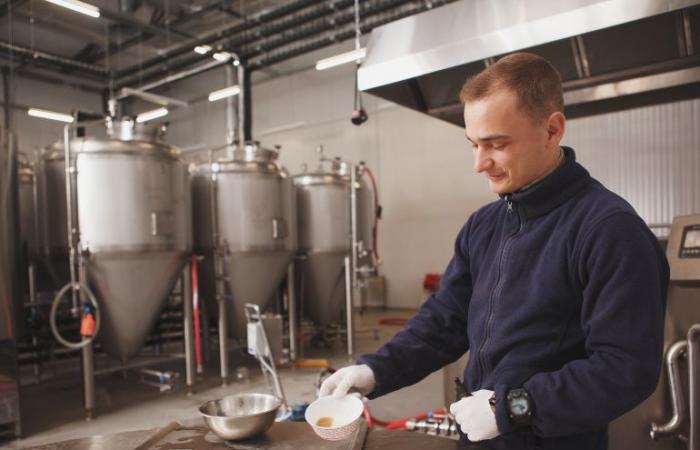Beer with Science: Resilience of British Craft Breweries Before and Post Covid-19
This article contributes to the literature on resilience and entrepreneurship in the craft brewing sector, but has limitations, such as focusing only on the period between March 2020 and September 2021, and specifically in the United Kingdom.
Interviews with brewers and statistical analysis of industry data gave us practical insights into the UK craft brewing industry before and after the Covid-19 pandemic. This study, which focused on the sector’s smaller breweries, found a distinct growth trend in the four years prior to Covid-191.
The results of the quantitative analysis show that the age of a brewery, the size of its beer portfolio, sales outside a 65km radius, the percentage of sales going to retail in distribution channels, the number of local charities and projects that the brewery supports, and the number of qualified and unskilled employees significantly increase the likelihood of a brewery exceeding the £50,000 turnover threshold (approximately R$319,000, at March 2024 rates)1.
This pattern, however, was drastically changed in March 2020 by the Covid-19 outbreak. The only ways to reach the market were supermarkets, unlicensed stores and direct sales, both at the brewery and online, following the abrupt closure of activities in the tourism, hospitality and events industries. After the first shock wore off, other tactics emerged, researchers said.1.
When it comes to brewers’ resilience, the data suggests that breweries that had pre-crisis assets – such as on-site bottling and canning machines and a functioning online store – were better equipped to weather the industry’s upheaval from restrictions. social and through confinement. Underutilized resources have been transformed into useful tools to increase resiliencetwo. These breweries demonstrated a greater ability to operationalize changes more quickly and adaptively than others, supporting the conclusions of other researchers3.4 about the high degree of agility and resource efficiency required by companies to change course in response to external circumstances.
Interviewees identified three key acts that typify a short-term focused response from breweries: a broad reconsideration of packaging (such as bags in boxes and small kegs), product line evaluation, and investigation of new distribution channels (online stores, drive-through thru and click-and-collect). Many of these responses were initially limited by readily available resources, autonomy, and bricolage in the model.5. “Bricolage” is a term originally borrowed from the French language, which refers to the process of creating something new or solving a problem using whatever materials or resources are available. It is often associated with a practical, do-it-yourself approach that involves improvisation and creativity. In this context, “bricolage” probably refers to the idea that many of the answers or solutions were initially limited by immediately available resources, as well as autonomy and the act of bringing together various elements to create a solution, following the proposed model.5. Essentially, it suggests that answers were shaped through better utilization of available resources and creative combination of different components to solve the problem at hand.
The results of the second round of interviews revealed that some craft breweries have sought to evolve into long-term strategic opportunities. These include a significant change in packaging (such as an increase in can sales, bottling and take-away growlers), a more strategic use of new marketing channels (such as online subscriptions and local direct sales or direct sales to bottle shops, omitting supermarkets) and a continued intensification of engagement through online sales.
Many brewers have looked for ways to present investment plans in response to changes in the business landscape and drive new areas of expansion to support survival in order to meet short-term needs.
On the other hand, some have chosen to fully or partially hibernate in the hope of quickly returning to life as it was before the Covid-19 pandemic. In these situations, the harsh restrictions imposed on the hospitality industry and associated industries, as well as remote work and the suspension of workers, served as an additional barrier, hindering the agility of small businesses in the sector in particular.6. Contrary to evidence that bureaucracy, which is often perceived as a barrier to innovation-led growth among larger and older organisations, may have benefited more established brewers over smaller ones, with loans and grants made readily available by the UK government , as confirmed through interviews. Compared to newer, smaller breweries, these are likely to have contacts and experience in the craft beer industry to help them deal with the administrative pressure of gaining commercial support.


Advertising
To improve brewers’ business resilience, researchers found that a strong local network was a crucial asset. This finding highlights the interaction between firm resources and entrepreneurs to influence their resilience response. Interviews revealed that smaller brewers were still likely to make the most of their connections with local communities, even as pre-Covid-19 correlations showed larger brewers’ greater involvement in charities and local initiatives compared to the smallest ones. Due to their reliance on licenses to sell beer, many businesses relied on local clientele to stay afloat during lockdown. Local networks are critical to the success of craft brewers, as demonstrated by the fact that those who were already involved in their communities were able to redirect a greater percentage of their sales to private customers than other companies.
As we can see, craft brewers in the UK have adopted online tools and developed business models to meet changing routes to market. However, the move to online sales raises questions about the resilience of the industry, particularly in relation to pubs and restaurants.
The UK government’s grants and soft loans during the pandemic helped many brewers survive, but some smaller brewers were less aware of investment opportunities. However, the “Job Retention Scheme” and “Restart support” have ended, and the increase in transport and energy costs, as well as the increase in water supply and packaging material, pose significant challenges for brewers still recovering from Covid-19.
The Autumn 2021 Budget introduced a 5% tax reduction on draft beer and cider to support licensed pubs and premises. However, this measure should also benefit large breweries and bar companies. The Campaign for Pubs and Real Ales (Camra) described this measure as “direct discrimination against the UK’s small breweries”. More targeted financial and logistical support, such as grants or schemes, is needed for smaller breweries.
In short, as UK craft brewers adapted to the new realities imposed by the pandemic, it became clear that resilience was essential for survival. Those that already had strategic assets and resources, such as their own filling machines and an established online presence, demonstrated greater capacity to face the challenges posed by the crisis.
However, the road to recovery still presents significant challenges. The end of government support programs, coupled with rising operating costs, puts additional pressure on breweries, especially smaller ones. The reduction in beer taxes announced in the Autumn 2021 Budget was met with criticism for not adequately addressing the needs of smaller craft brewers.
The UK craft brewing sector continues to face significant challenges as it recovers from the Covid-19 pandemic. To ensure its long-term resilience, more targeted financial and logistical support is essential in order to sustain the vitality and diversity of this essentially local and community market.
A big hug to everyone and health!
Bibliographic references:
1 Waehning, N., Bosworth, G., Cabras, I., Shakina, E., & Sohns, F. (2023). Resilient SMEs and entrepreneurs: evidence from the UK craft brewing sector. International Journal of Entrepreneurial Behavior & Research, 29(3), 665-686.
2 Ayala, JC and Manzano, G. (2014), “The resilience of the entrepreneur. Influence on the success of the business. A longitudinal analysis”, Journal of Economic Psychology, Vol. 42, pp. 126-135.
3 McCann, J. (2004), “Organizational effectiveness: changing concepts for changing environments”, Human Resource Planning, Vol. 27 No. 1, pp. 42-51.
4 Dormady, N., Roa-Henriquez, A. and Rose, A. (2019), “Economic resilience of the firm: a production theoretical approach”, International Journal of Production Economics, Vol. 208, pp. 446-460.
5 Branicki, L.J., Sullivan-Taylor, B. and Livschitz, SR (2018), “How entrepreneurial resilience generates resilient SMEs”, Entrepreneurial Behavior and Research, Vol. 24 No. 7, pp. 1244-1263.
6 Cowling, M., Liu, W. and Zhang, N. (2018), “Did firm age, experience, and access to financial count? SME performance after the global financial crisis”, Evolutionary Economics, Vol. 28, pp. 77-100.
Marcelo Sá He is a professor of operations management, a researcher in the area of risk and resilience in food and beverage chains, a husband and father in love with his family. On his day off, he can easily be found with an IPA by his side.
Tags: Resilience British craft brewers postCovid19
--







